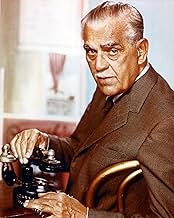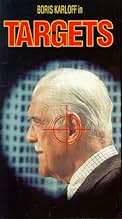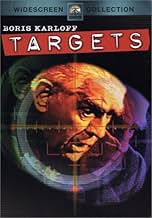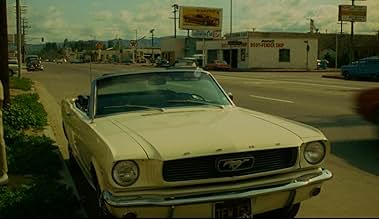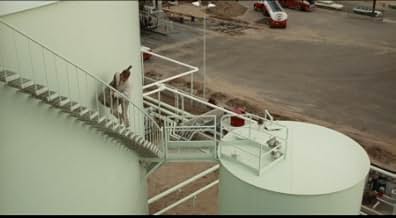Un'anziana star di film horror, mentre fa un'apparizione personale in un teatro drive-in, affronta uno psicotico veterano della guerra del Vietnam che si è trasformato in un cecchino assassi... Leggi tuttoUn'anziana star di film horror, mentre fa un'apparizione personale in un teatro drive-in, affronta uno psicotico veterano della guerra del Vietnam che si è trasformato in un cecchino assassino di massa.Un'anziana star di film horror, mentre fa un'apparizione personale in un teatro drive-in, affronta uno psicotico veterano della guerra del Vietnam che si è trasformato in un cecchino assassino di massa.
- Regia
- Sceneggiatura
- Star
- Premi
- 1 vittoria in totale
- Marshall Smith
- (as Monty Landis)
- Waiter
- (as Tim Burns)
Recensioni in evidenza
It establishes itself permanently in my good graces as a viewer because, by default, it provides a near documentary look, what with its plentiful use of location shooting, of Southern California circa 1967. It captures, more strikingly than any film I know, the texture of a particular time. The cars, the clothes, the signs, the drive in, the suburban houses speak subliminal volumes; it is nothing short of a neural map of a time.
This is Bogdanovich's first full directorial effort. (He had shot part of Wild Angels for Corman a while before, and Corman was impressed enough with his work there to offer him his own feature. These details and more are related in the excellent Bogdanovich commentary track that, amazingly, is included on the new "budget" DVD.) To secure the assignment, he had to agree to incorporate 20 minutes of footage from the Corman cheapie The Terror (or that was the plan at the outset) and shoot an additional new 20 minutes, or two days, with Boris Karloff. Throw in 40 minutes of your own storyline invention, and voila, instant New Drive In Movie, Roger Corman style. The project eventually grew beyond that. (The final tally: $125,000 by Bogdanovich's recollection, with $25,000 of that going to Karloff for 5 days shooting. Bogdanovich's first script killed off Karloff half way through to accommodate the budget and schedule. Sam Fuller, it was, who advised him strongly to ignore all that stuff if the story demanded more than 2 days with Karloff.)
Targets feels like a European film of its time. This says to me, above all, that Bogdanovich wanted to make certain he was making a modern film, his own film, and not an easy pastiche/homage to the American directors he had enshrined in writing before becoming a director himself-- Ford, Hawks, Hitchcock, Welles et al. I would almost call the narrative voice he assumes here passive. The absence of a film score adds to this feeling. But it is not semi-documentary; there is nothing even remotely Dragnet about Targets. It is spare, clean, modern, lacking in embellishment or decoration, but the people speak naturally, move fluidly and seem real. And there is a stillness, again a feeling enhanced by the lack of music, that creates verisimilitude, but also a general sense of unease.
The story of Targets is based on the case of Charles Whitman, the young man who climbed a tower in Texas in 1966 and staged a sniping siege on pedestrians and motorists below. An editor at Esquire had suggested this as a great film topic to Bogdanovich when he was writing some film criticism for them. Bogdanovich and his wife at the time, Polly Platt, based their first scenario on this news story, and got a major script doctor assist from director Samuel Fuller (The Big Red One; Shock Corridor, Pickup on South Street).
One of the most interesting things the new DVD commentary track points out is the number of times Bogdanovich achieved remarkable long take tracking shots. I missed them on first viewing; they are so discreetly handled that even a die-hard film fan and geek may be unaware of them. Too often, this is the sort of shot that calls a lot of attention to itself, as a flamboyant statement of the director's mastery for its own sake. It would have been easy for a first-time director to get snared in flashy games-playing. But instead, these takes are slipped seamlessly into the weave of the story, enhancing the everyday feel, the naturalism of Targets. (The best long take scene-- and one of the most telling scenes in the movie-- begins with a couple of minutes of the family sitting in the darkened living room watching The Joey Bishop Show on TV; Mom and Dad beg early work tomorrow and head off to bed; the young couple go down the hall to the bedroom, where the wife dresses for work; then we go back to the living room where Bobby sits alone for a bit watching TV. All without a cut. It is a charged, still few minutes in which Bobby makes his one and only sad little bid to talk out his inner turmoil with the person to whom he is closest.)
This doesn't even get into the touching and amusing Karloff subplot, about an old horror star resignedly coming to terms with his obsolescence. He says his type of horror can't match the horror of the modern world, and as proof he holds out a newspaper with a headline about a teenager shooting six people in a local grocery.
Small budget films do not get any better than this. --Neither do most large budget, these days. 10 stars. See it.
Cineaste Peter Bogdanovich's debut directing effort, sadly, to this day remains a topical hot spot. Released as it was just after the assassinations of Martin Luther King Jr. and Robert Kennedy, Targets carried much relevance even though it was hardly a success at the box office. Over the years it has come to gain a cult following that is much deserved, the low budget production value actually helping to keep it uneasily potent.
Story is structured by way of two separate narrative threads, one sees Karloff as veteran horror film actor Byron Orlock, who sees himself as an anachronism and announces his retirement from movie making. His reasoning, warranted, is that his type of horror is way behind the times, the real horror is out there on the streets, bleakly headlined in the local newspaper. The other thread concerns Bobby Thompson (O'Kelly), a handsome boy next door type who has a pretty wife but finds himself unemployed and still living with his parents. He is a ticking time bomb, his mind soon to fracture and devastation will follow. The two stories converging for a bloody finale at a drive in movie theatre, where Orlock is making a special guest appearance, the old time horror of the movies coming face to face with the real terror of the modern world.
Though uncredited by choice, the screenplay belongs to Fuller, something that Bogdanovitch has always been keen to point out, and it's with the writing where the film gets its quality factor. The messages within are serious and handled evenly by Bogdanovitch, his pacing precise and in Karloff he has the perfect icon from which to underpin the story. True enough the acting around Karloff is sub-standard, notably from the director himself, but with Bogdanovich deliberately keeping the psychological explanation for Bobby's actions vague, film manages to rise above its flaws to leave an indelible mark. 8/10
As usual when it comes to Roger Corman productions, the story behind the film is just as interesting (often more so) as the film itself. Karloff apparently owed Corman a couple of days work, so he was handed to Corman protégé Peter Bogdanovich, and told him to make whatever film he liked - as long as it was cheap, quick, included footage of his film The Terror (1963), and drew on the recent Charles Whitman killings. So, with the help of screenwriter Samuel Fuller, Bogdanovich crafted an intelligent, shocking, and extremely interesting film that what way ahead of its time.
Targets is many things. On one hand it is a warm love-letter to the legendary actors of old. In one scene, Michaels enters Orlock's hotel room, them both being drunk, and watch the end of Howard Hawks' The Criminal Code (1931), which starred a younger Boris Karloff. They briefly discuss the genius of Hawks and Michaels comments on what a fine screen presence Orlock (really Karloff) was, and still is. It is also a first-rate thriller. Tim O'Kelly is very effective as the clean-cut, all-American boy, who is becoming increasingly shaken about the person he finds himself becoming. In real-life, Whitman was found to have an aggressive brain tumour that was believed to be the cause of the sudden killing spree. The violence, though not gratuitous or exploitative, is shocking and nasty. The murder scenes are shot with a slow and detailed precision that are scary given the real-life occurrences.
Most interestingly, the film is a commentary on the generation gap, in both society and in cinema. Michaels states that "all the great films have already been made." Of course, this is not true - America was about to enter its true golden age, when the likes of Martin Scorsese, Steven Spielberg, George Lucas, Dennis Hopper, Francis Ford Coppola, Michael Cimino, and Bogdanovich himself shook Hollywood to its core. But Michaels is reflecting Orlock's fear of the new. Orlock is retiring because "it's a young person's world," and he feels he no longer has his place. The film builds up to the inevitable meeting of Orlock and Thompson - the old vs. the new, if you will.
Targets is quite hard to sum up. It is genuinely a hidden gem, and a true original that should be seen by anyone interested in cinema. Karloff would sadly pass away a year after this film was released, and he gives what is possibly his finest career performance. He has no scary make-up or sets to drown him out. He is simply an old man, walking stick and all. Although he made a couple more films after this, Targets seems his true and fitting exit from cinema. This is close to an 'A'-movie that I've seen a B-movie get, and again proves that Roger Corman was a true cinema genius.
www.the-wrath-of-blog.blogspot.com
Bobby goes home and you see that, though married and mid-20s, he still lives at home with his parents in a middle class neighborhood. There is no friction at home. From the conversation his parents seem understanding of the "nervous" troubles he's had since returning from Vietnam and readjusting to civilian life. His wife is affectionate and seems to have no problem working night shift at the phone company at a time when most women did not work. And yet amid this family support and kindness, Bobby feels inadequate and develops a desire to kill. The night before his spree starts he tries to bring up his urges to his wife. At that point he wants to be stopped. But then something in him breaks. Killing is not something he does with any malice. It's just something he feels compelled to do for reasons we are never given. He does seem to look on others as just "targets{".
So Bobby's story eventually coincides with that of Byron Orlock, who agrees to do just one more public appearance at a drive-in theater before retiring. This is where Bobby also decides to go for the final stage of his killing spree, since the police are now on to him and know his identity.
When he opens fire on the moviegoers that night from behind the movie screen, they have no idea why they are being shot and are in disbelief that something like this could be going on. Today people would immediately understand the threat because this sort of thing is much more common.
Bogdanovich got the idea for the film from the real-life sniper Charles Whitman, who killed 15 people and injured dozens more at the University of Texas in the worst mass shooting up to that time.
The whole thing is a kind of comparison of what constitutes horror in the old days when Orlock was making films versus this new modern kind of menace that Bobby Thompson poses. It came about because Bogdanovich had been pestering Roger Corman to let him direct. Corman discovered that Karloff owed him two days of work because a prior film had wrapped early; he told Bogdanovich to take 40 minutes of the earlier THE TERROR, the two days of Karloff's services, and $50,000, and to make whatever he wanted. Bogdanovich and his then-wife Louise Platt wrote the script (using very little of THE TERROR) and sent it to Karloff. It took five days to shoot Karloff's scenes, but he threw in the other three days gratis.
There are some minor questions I had - Why is Thompson constantly eating Baby Ruths and drinking Pepsis? Does he possibly have hypoglycemia, which can really mess with your ability to be rational? Why is the Thompson home a sickly green inside and out? The interior walls, the curtains, even the paper towels are this color.
Lo sapevi?
- QuizRoger Corman told director Peter Bogdanovich that he could make any film that he wanted to, on two conditions: he had to use stock footage from the film La vergine di cera (1963), and he had to hire Boris Karloff for two days (Karloff was under contract to Corman and owed him those two days). Karloff was so impressed with the film's script, however, that he refused any pay for any shooting time over his contracted two days. He worked for a total of five days on it.
- Blooper(at about 39 minutes into the film) As Bobby drags his mother's dead body to her bedroom, a camera shadow can be clearly seen moving up the wall and the door to the left.
- Citazioni
Byron Orlok: Ladies and gentlemen, boys and girls, I'd like to leave you with a little story to think about as you drive home - through the darkness. Once upon a time, many years ago - there should be a pin spot on my face as I'm talking - once upon a time, many, many years ago, a rich merchant in Baghdad sent his servant to the marketplace to buy provisions. And after a while, the servant came back, white-faced and trembling, and said, "Master, when I was in the marketplace, I was jostled by a woman in the crowd, and I turned to look, and I saw that it was Death that jostled me. And she looked at me and made a threatening gesture. Oh, Master, please, lend me your horse, that I may ride away from this city and escape my fate. I will ride to Samara, and Death will not find me there." So the merchant loaned him the horse, and the servant mounted it and dug his spurs into its flank, and as fast as the horse could gallop, he rode towards Samara. Then the merchant went to the marketplace, and he saw Death standing in the crowd, and he said to her, "Why did you make a threatening gesture to my servant when you saw him this morning?" And Death said, "I made no threatening gesture. That was only a start of surprise. I was astonished to see him here in Baghdad, for I have an appointment with him tonight in Samara."
- Curiosità sui creditiThe film's original theatrical prints began with a written title card that read, "Why gun control? Why did a lunatic sniper kill or maim 11 innocent victims in Texas on June 3, 1966? Why were over 7,000 Americans slain or wounded by gunfire in 1967? Why in 1968 after assassinations and thousands of more murders has our country no effective gun control law? This motion picture tells a story that sheds a little light on a very dark and a very deep topic." This title card was added by Paramount Pictures only as a result of the then-recent assassinations of both Doctor Martin Luther King and Senator Robert F. Kennedy, but it was not approved by the film's director, Peter Bogdanovich at all and, as a result of this, it was removed from all later releases of the film, including those for home video.
- Versioni alternativeThe film was cut for a "GP" rating only once, mainly for a 1971 re-release of it in order to capitalize on the success of Peter Bogdanovich's then-recent hit film, L'ultimo spettacolo (1971). Later releases of it on home video were all uncut.
- ConnessioniFeatured in 100 Years of Horror: Boris Karloff (1996)
- Colonne sonoreGreen Rocky Road
(uncredited)
Written and performed by The Daily Flash (Don MacAllister, Steve Lalor, Jon Keliehor and Doug Hastings)
I più visti
- How long is Targets?Powered by Alexa
Dettagli
Botteghino
- Budget
- 130.000 USD (previsto)
Contribuisci a questa pagina



